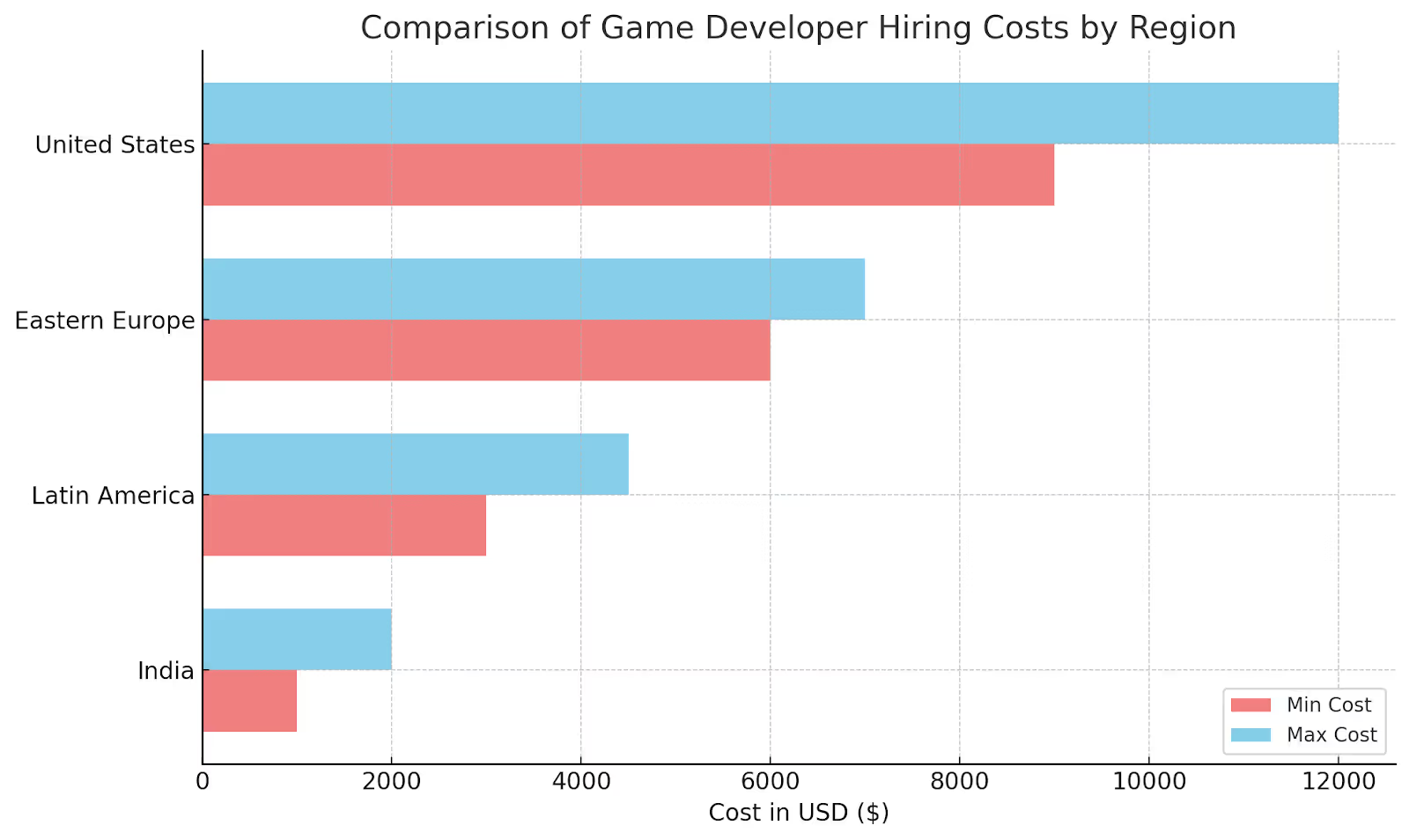How much does it cost to hire a game developer? This is a common question at the beginning of any video game project, and the answer depends on several key factors. Costs can vary significantly depending on experience level, location, and the type of game you're building.
In this blog, we’ll break down the true cost of hiring a game developer. We’ll also explore how outsourcing, particularly to regions like Latin America, can provide access to high-quality talent while keeping costs down. Whether you're a startup or an established studio, this guide will help you plan smartly.
What Kind of Game Developer Does Your Project Need?
Before diving into how much does it cost to hire a game developer, it’s essential to understand the different types of developers and what each brings to a game project. The scope, platform, and complexity of your game will determine the kind of specialist you need — and ultimately influence the cost.
Here are some of the most common types of game developers companies hire:
- Gameplay Developer: Designs and implements player interactions, game mechanics, and controls — a key role for user experience.
- Graphics or Rendering Engineer: Focuses on performance and visual fidelity by optimizing 2D/3D graphics and visual effects.
- AI Developer: Programs the behavior of non-playable characters (NPCs), decision-making systems, and pathfinding algorithms.
- Tools Developer: Builds internal tools that speed up production, like level editors, custom engines, or automation scripts.
- Mobile Game Developer: Specializes in games for iOS and Android, often using engines like Unity or Godot.
- Full-Stack Game Developer: Often used in small studios, handles both front-end (game logic) and back-end (server, database) systems.
Each role has a direct impact on the development timeline, product quality, and overall budget — which is why identifying the right profile is the first step to calculating costs accurately.
Now that you know what kind of game developer your project might need, let’s look at the key factors that influence the cost of hiring one.
Find out more about hiring Nearshore Game Developers.
How Much Does It Cost to Hire a Game Developer?
On average, how much does it cost to hire a game developer? Most companies can expect to pay between $3,500 and $7,500 per month, depending on the developer’s experience, location, and project complexity. This translates to roughly $22 to $47 per hour, assuming a full-time schedule of 40 hours per week.
Factors That Influence Game Developer Costs
When hiring a game developer, several factors impact the cost. These include:
1. Experience Level:
- Junior Developers: A beginner with 1–2 years of experience.
- Mid-Level Developers: Developers with 3–5 years of experience who can take on more complex tasks.
- Senior Developers: Experienced professionals who can handle everything from game design to complex coding tasks.
2. Type of Hiring:
When hiring a game developer, you generally have three options: freelance, in-house, or outsourcing. Each model offers different benefits and costs.
- Freelance: Freelance developers generally charge by the hour or per project. While they can be more affordable, their availability and work quality can vary.
- In-House: Hiring a full-time developer means adding them to your team, which includes salary, benefits, and overhead costs.
- Outsourcing: Outsourcing is the practice of hiring external teams or developers to handle specific parts of a project. It allows companies to reduce costs, access specialized talent quickly, and scale development without the overhead of in-house hiring.
If you're looking for a cost-effective solution with long-term value, outsourcing to Latin America can be your best bet — offering up to 40% lower costs and a smoother hiring process.
Learn more about the best countries for outsourcing developers.
3. Game Developer Rates by Location
When a U.S. company seeks to hire a video game developer, geographical considerations can play an important role in the decision-making process due to variations in cost, talent quality, and cultural differences. The table below compares the costs and advantages and disadvantages of hiring in different regions of the world, such as India, Eastern Europe, Latin America, and the United States.
1. United States
Cost: Hiring a video game developer in the US is expensive. The average monthly salary for a video game developer ranges from $9,000 to $12,000, depending on experience and location.
Pros:
- No language or cultural barriers: Communication is direct, with no need for translation or interpretation.
- High availability: Since they are in the same time zone, there are no scheduling issues.
Cons:
- High cost: Prices are significantly higher than in other regions, which may make this option less appealing to companies with limited budgets.
2. Eastern Europe
Cost: Developers in Eastern Europe are less expensive than those in the US, averaging between $6,000 and $7,000 per month.
Pros:
- Good value for money: The quality of work is high, and the cost is much more affordable than in the US.
- Ease of communication: English is widely spoken, which facilitates communication, and the time zone is convenient for companies in the US.
Cons:
- Possible lack of specialization: Although there is a lot of talent, some countries have less specialization in specific areas of video game development than other places.
- Bureaucracy: Labor laws in some Eastern European countries can be complex, which could delay the hiring and payment processes.
3. Latin America
Cost: Costs are much more affordable in Latin America. Average salaries range from $3,000 to $5,000 USD per month.
Pros:
- Competitive costs: Video game developers in Latin America earn considerably less than their counterparts in the US, enabling US companies to access qualified talent.
- Time zone proximity: Many Latin American countries have time zones similar to those in the US, facilitating real-time coordination.
- Similar culture: Cultural proximity and the ability to easily adapt to the US work environment are significant advantages. Most developers speak English at a functional level and understand the nuances of North American markets.
Cons:
- Infrastructure issues: In some areas, internet infrastructure and connections may be less reliable than in the US. This can affect productivity.
- Economic and political challenges: Developers in some countries may face political and economic instability, which can impact long-term retention and job satisfaction.
4. India
Cost: Developers in India are known for being extremely cost-competitive. Salaries range from $500 to $2,000 USD per month, depending on experience and project type.
Pros:
- Very low cost: This makes it one of the most economical options for companies that need to invest heavily in software development without exceeding their budget.
- Abundant talent: India is known for its vast, skilled technology workforce, and many developers have a strong background in computer science.
Cons:
- Time zone: The time difference can make real-time collaboration difficult, especially for projects that require frequent meetings and rapid idea exchange.
- Potential differences in quality: While there is a lot of talent, not all Indian developers specialize in the video game industry.

How to Find and Evaluate Game Developers
If you're a U.S.-based company looking to hire a game developer — especially in Latin America — following a structured process will help you reduce risks, control costs, and find talent that aligns with your needs.
1. Define Your Needs
Start by clearly outlining the role. What kind of game are you building? Do you need a specialist in gameplay mechanics, multiplayer systems, mobile platforms, or AI? Understanding the scope of your project will determine whether you need a mid-level developer, a senior specialist, or a team lead.
2. Look at Portfolios
A developer’s portfolio is one of the best indicators of skill and creativity. Look for:
- Variety in projects and game genres
- Experience with the game engine you plan to use (Unity, Unreal, Godot)
- Examples of shipped or published games (if available)
3. Conduct Technical Evaluations
Use interviews or short technical challenges to evaluate:
- Proficiency in programming languages (C++, C#, etc.)
- Familiarity with game engines and frameworks
- Problem-solving skills and performance optimization knowledge
4. Prioritize Transparent Communication
When hiring across borders, especially in LATAM, it's critical to work with individuals or firms who communicate clearly. Choose candidates who are comfortable working across time zones and who can document and present their work effectively.
5. Consider Working with a Specialized Recruitment Company
If you're not familiar with the LATAM market, consider partnering with a recruitment company that specializes in sourcing talent from the region. Look for one that offers:
- Transparent pricing (no hidden fees or vague commissions)
- Vetting and testing of candidates (technical and language skills)
- Clear hiring models (contract, full-time, or project-based)
This can help you balance cost savings with quality and avoid the common pitfalls of hiring remote developers.
6. Test the Relationship First
Start with a small task, project, or trial period before fully committing. This gives you time to evaluate both the technical skills and the working relationship.
Why Hire Game Developers Through Teilur Talent
Teilur Talent doesn’t just send over qualified developers — they take the time to make sure each candidate understands your company, your mission, and the project they’d be working on. Only those who show real interest and alignment are submitted. This results in more motivated hires and fewer mismatches. Candidates know what they’re joining, and they want to be part of it.
Transparent Pricing and Long-Term Value
Teilur Talent charges a flat 20% commission, with no hidden fees or future markups. If you decide to raise your developer’s salary, 100% of that increase goes to the talent. This approach fosters trust and loyalty, and helps keep developers around for the long term. Teilur also adapts to your hiring needs — whether you're building a core team or need someone just for a two-month sprint.
Learn more about how Teilur Talent is disrupting the recruiting industry with transparent pricing.
Ongoing Support
Hiring doesn't end once a developer joins your team. Teilur continues to check in regularly with both you and the developer — especially during the early stages. These biweekly and monthly touchpoints help catch issues early and strengthen collaboration. And when developers need resources to grow or navigate challenges, Teilur offers mentorship, learning support, and access to a wider community.
FAQ
How much does it cost to hire a video game designer?
The cost typically ranges from $30 to $120 per hour, depending on the designer's experience level, location, and the complexity of the game. If you hire someone from Latin America, however, you can expect to pay closer to the lower end of that range — often 40% less than U.S. rates.
How much does it cost to hire a freelance game designer?
They generally charge between $35 and $100 per hour, depending on their portfolio, area of specialization (2D, 3D, UI/UX, etc.), and the scope of the project.
How much does it cost to design a game?
Depending on the scale and type of game, designing a game can cost anywhere from $5,000 to over $100,000. Hiring talent from Latin America can significantly reduce design costs while maintaining quality.
How much does it cost to hire an artist for a game?
In Latin America, hiring a full-time game artist is much more cost-effective. Mid-level talent averages around $3,500 per month, senior artists average around $5,625 per month, and expert-level professionals earn $7,500 per month or more.
Conclusion
Understanding how much it costs to hire a game developer is key to managing your game development budget wisely. With competitive rates, time zone alignment, and skilled talent, Latin America offers one of the best options for cost-effective hiring.
To get a clearer picture, try our cost calculator to estimate monthly expenses based on experience level and location. And if you’re ready to take the next step, book a free call with us — we’ll help you find the ideal game developer for your project.







